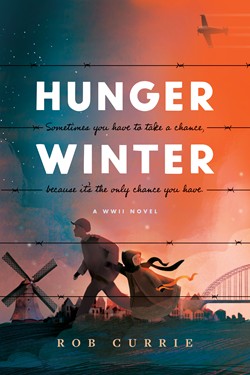
Rob Currie is an award-winning author with a lifelong fascination with World War II. The son of a World War II veteran, Rob enjoys making school presentations to share his contagious enthusiasm for history. An experienced public speaker as well as radio and TV guest, he knows how to reach an audience by sharing interesting and relevant material. Rob and his wife live in northern Illinois, where they raised two sons. His full-time job is teaching psychology at Judson University in Elgin.
Q: What motivated you to write Hunger Winter?
A: When he was in eighth grade, my son wrote a two-page story about World War II in the Netherlands. I thought it was interesting and suggested we could write a longer version of that story together for fun. The idea was that we would each write half of the chapters. He agreed but soon became more interested in being a teenager than writing a story. By that time I was hooked on the story, and I decided to finish writing it.
Q: Why did you choose World War II and the Dutch famine as your story focus?
A: I’ve loved learning about World War II since I can remember, thanks to my father, who was a World War II vet. My wife is of Dutch heritage, so it seemed a logical focus. As I got into the research, I learned about that awful part of the war the Dutch call the Hongerwinter. When I discovered that many people don’t know about this part of the war, I knew I had to write about it.

Q: What made you want to write historical fiction?
A: I’ve loved history ever since I discovered a series of biographies in my elementary school’s library. So when considering fiction, historical fiction seemed like a natural way to go.
Q: How much research did you have to do on that World War II time period in the Netherlands?
A: I’ve been reading World War II books for decades. But I had to read more material that was specific to the Dutch experience, and I interviewed several survivors of the Hunger Winter.
Q: As you did research for this book, what surprised you the most?
A: I was surprised to learn how the Luftwaffe used kindness to get captives to reveal secrets. After the war, some of the American prisoners of war who had been interrogated reached out to their Luftwaffe captors because they had developed a friendship with them.
Q: Which books or authors influenced the way you wrote this book?
I based Colonel Fleischer very loosely on Long John Silver in Treasure Island because I think he’s an interesting and complicated character.

Q: Do you see any of yourself in the characters in this story?
A: No. I think good story characters are more compelling if they are more than just an extension of the author’s personality.
Questions about Writing
Q: What’s the biggest challenge in writing for kids?
A: I had to learn to adjust my writing to how young characters think and talk.
Q: What’s the hardest thing about writing fiction?
A: You have to write something that surprises the reader but at the same time is believable.
Q: How do you deal with writer’s block?
A: Sometimes I get stumped about how to proceed with a storyline. I deal with that by reading books similar to mine and by conferring with the members of my writers’ group.
Q: How do you motivate yourself to write?
A: When I get enough exercise and sleep and drink lots of water, my brain works better, and I am enthusiastic about writing.

Q: What’s something most people don’t know about the writing process?
A: A lot of wonderful kids’ books started out as stories written for a child the author loved. Examples include Treasure Island and The Lion, the Witch, and the Wardrobe.
Q: Tell us about your journey to write this book.
A: After I finished writing the book, over a period of five years, agents and editors advised me to change the story. Their requests, which came one at a time, included requests to add 10,000 words, show more of the characters’ feelings, give more detailed descriptions, make it more unique, add chapters about Dirk’s older sister, and more. Each time, it was a six month process of changing the story to incorporate the good advice, and I hoped that this time it would be accepted. But it was always turned down or no response was given.
Finally it reached a point that a trusted friend in the book business told me to move on to another book project and let this one go. Then late one afternoon I received an email from my agent saying we had an offer from Tyndale. It was a long road, but every person who pushed me to change the book made it better, and I am grateful for their suggestions. Looking back I see the purpose in the process. Soren Kierkegaard once said, “Life can only be understood backwards; but it must be lived forwards.” I wanted the book to be published five years ago but God wanted more time to refine it and me.
Q: What’s something you’ve been thinking about recently?
A: A friend told me that whatever is happening in my life is what God has put on my “syllabus of life” for me to learn. Given that perspective, I should be less like the student who wants to crank out the answers to the math problems without learning anything, and more like the eager learner who really tries to get what the lesson is about. This new perspective pushes me to stop perceiving difficulties as annoyances to be dealt with or swatted out of the way, and start seeing them as learning opportunities to be pondered and responded to with patience.
 Hunger Winter by Rob Currie
Hunger Winter by Rob Currie
The thrilling story of one boy’s quest to find his father and protect his younger sister during the great Dutch famine of World War II.
“Sometimes you have to take a chance, because it’s the only chance you have.”
Thirteen-year-old Dirk has been the man of the house since his papa disappeared while fighting against the Nazis with the Dutch Resistance. When the Gestapo arrests Dirk’s older sister, who is also a Resistance fighter, Dirk fears that he and his little sister, Anna, might be next.
With only pockets full of food and his sister asleep in his arms, Dirk runs away to find his father. As Dirk leads Anna across the war-torn Netherlands, from farmyards to work camps, he must rely on his wits and his father’s teaching to find his way. Learn More HERE>>>




